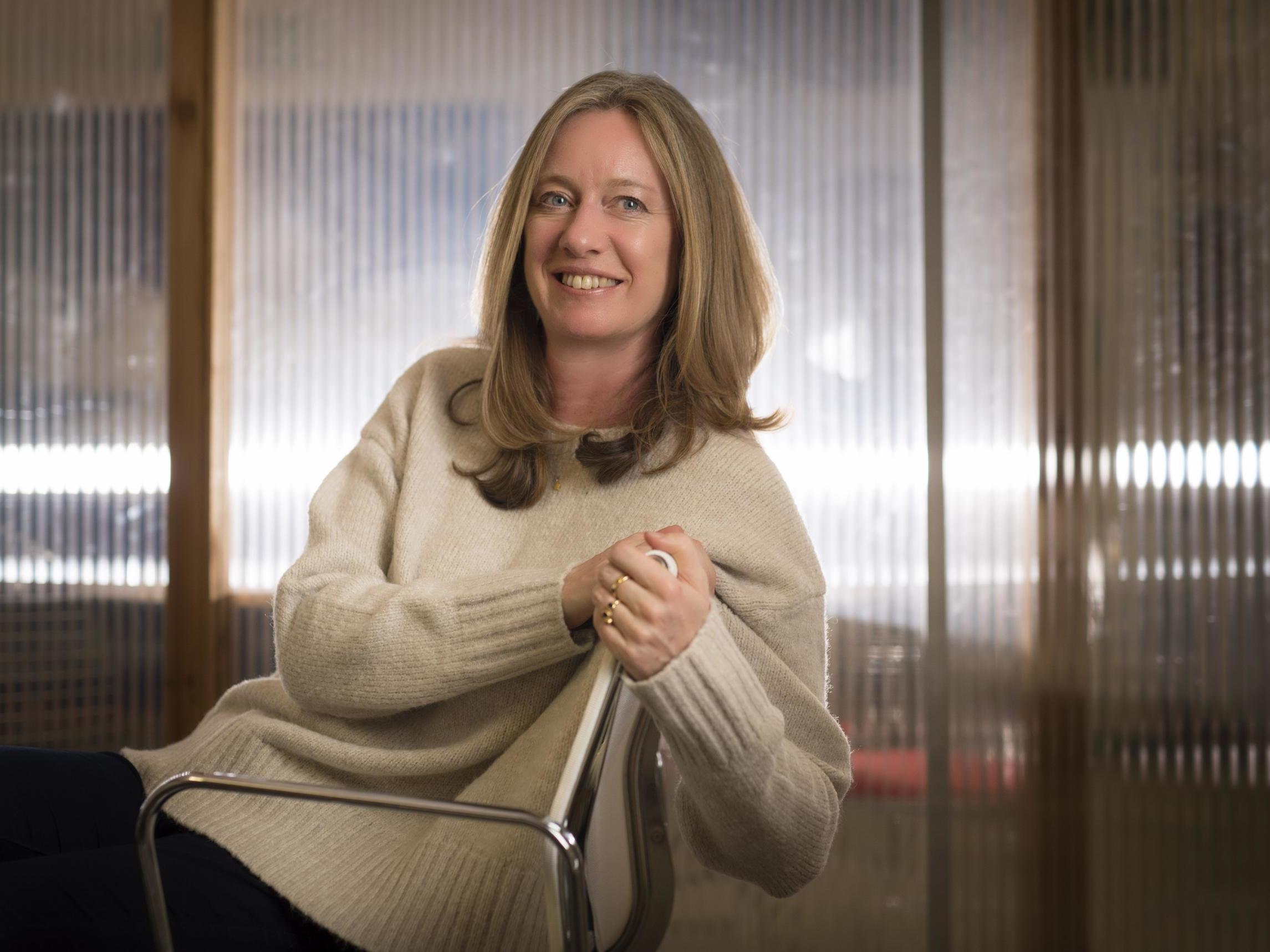The Independent's journalism is supported by our readers. When you purchase through links on our site, we may earn commission.
A View from the Top with Mumsnet founder Justine Roberts on how getting sued contributed to the platform’s success
The former banker turned internet entrepreneur tells Zlata Rodionova about Mumsnet’s role in the age of fake news and why you should always wear trainers


The joy of new motherhood can often be accompanied by feelings of isolation and dozens of questions. From “how to change a nappy?” to “am I holding my baby too much?”, it turns out that when you’re sleep-deprived, even little challenges can throw you into a tailspin.
Determined to change all of that, former investment banker and sports journalist Justine Roberts launched Mumsnet back in 2000.
Originally conceived as a forum where mothers could simply swap family and relationship advice, it is now the UK’s busiest social network for parents.
With 14 million unique users and 128 million page views every single month, it challenges both businesses and government over attitudes to children and parenting.
Roberts, a mother-of-four, first dreamt up the idea of Mumsnet after a catastrophic family holiday with her one-year-old twins in Florida in 1999.
“It was the first holiday I’ve taken as a parent and we picked everything wrong – from destination to time zone and resort,” she tells The Independent. “At the time I just wished I had asked another parent for advice.
“And it’s not just about holidays, is it? It’s everything else we don’t know about and that we are not trained for. I thought, there’s this thing called the internet, which just allows you to share and tap into the knowledge of other people far and wide. It seemed like an obvious medium to share parenting tips.”
Four months later, the website was born – but it was far from the online behemoth it is today.
“I wrote a business plan and tried to raise some money but then the dotcom bubble burst and everyone thought the internet was over,” Roberts says.
“It turned out to be quite good for us in the end. If we would have raised a lot of money straight away, we would have ended up with a lot of costs – it wasn’t really a revenue model that made sense for us at the time.”
In the early days, Roberts confesses that the forum mainly consisted of her talking to herself and asking questions under different usernames to create the illusion of activity.
She says: “I remember vividly a friend of mine asking me for some advice and I said, ‘Well I know the answer to your question but I want you to ask it on Mumsnet.’
“She did and I rushed to the website to give her an answer but two people responded ahead of me and I thought, ‘OK, it’s coming to life’”.
According to Roberts, two crucial events raised the profile of the company – and curiously one of them was a lawsuit.
Parenting expert Gina Ford sued Mumsnet for defamation and threatened to shut the website down after being offended by the criticism she received on the site in 2006. The case was eventually settled in court but it catapulted Mumsnet into the mainstream.
People tend to associate mothers with being a bit dull, stupid, very insular, humourless. Mumsnet is actually not like that at all
“It wasn’t pleasant at the time, but it certainly raised our profile more than any advertiser since then. It became a bit of a cause for freedom of speech on the internet.”
The launch of Facebook in the UK in 2005 also worked in Mumsnet’s favour. “From a pure revenue perspective, brands that had been very shy at associating themselves with us began to think the internet was something they should be part of,” says Roberts.
“We never felt threatened by Facebook itself. On our forum, people ask questions they are perhaps too shy to ask out loud and they speak the truth whereas Facebook is essentially an edited version of your life or how we want others to see it.”
Of course, the honest dialogue on Mumsnet is also what lies behind the platform’s somehow awkward reputation. A conversation thread on the forum almost crashed the site’s server in 2013 after a woman admitted that her lover used a “penis beaker” to clean himself after sex.
But Roberts has an uncompromising attitude when it comes to her critics.
“In this world of filtered bubbles and fake news, freedom of expression is very important. We try to represent diverse views from all mothers, not a particular kind of mother or a particular political leaning. Our moderators do a marvellous job at keeping the conversation going.

“People tend to associate mothers with being a bit dull, stupid, very insular, humourless. Mumsnet is actually not like that at all. It is genuinely a community. People go out of their way, anonymously, to give out their time and expertise for others – whether it’s facilitating a donation or staying up until 2am helping someone who’s struggling to breastfeed.”
Roberts has had some tense moments with the website. It has been targeted by hackers and Roberts’ own house was “swatted” – a type of harassment in which a perpetrator calls the emergency services out to their victim on a false pretence.
“It felt like an attack motivated by the fact that they didn’t like mouthy women and they were having a bit too much of air time,” she says.
“The great thing about Mumsnet is that there’s a lot of us. There’s safety in numbers and I must say that users have always been very supportive in difficult times, so that’s what keeps us going.”
For someone who’s used to facing lawsuits and daily criticism, Roberts seems incredibly composed and excited about what lies ahead. “When I get stressed, I go into nature, watch football with my kids and turn the phone off from time to time – I think we all need a break.”
And after 20 years in business, she still has many plans for Mumsnet. The company is about to launch a podcast based one of the website’s most popular forums called: “Am I being unreasonable?”
“We have so much insight as to what parents’ problems are because obviously they are sharing them with us. Evolving and finding solutions to these problems is what excites me at the moment,” she says.
She’s also hoping that she’ll get Michelle Obama or Theresa May to participate on one of Mumsnet’s notorious live webchats. Previous chats have included David Cameron, Gordon Brown and Nicola Sturgeon among many others.
“Michelle Obama would be my dream guest, she is amazing, so it would be great to have her on. We also haven’t persuaded Theresa May to come on yet, that would be really interesting I think. She’s the only prime minister in recent history that hasn’t participated in a Mumsnet live chat, so hopefully we’ll be able to persuade her.”
Roberts has also recently taken part in Secret Leaders – a business podcast that dives deep into the stories of top CEOs, their brand and their personal lives.
“I wanted to participate in that because they make a real effort to get woman CEOs on air. It’s hard because it’s not 50/50 out there yet. So it’s really important that women are part of the conversation and they contribute to that.
“After 20 years, I’ve made a lot of mistakes and I’m a firm believer that each mistake is a lesson, so I’d also quite like to pass on what I’ve learnt.”
So what are the biggest lessons she has learnt from running a successful business and being a mother of four? “You have to give all hope of being a perfectionist,” she says. “You have to just try and prioritise what is important and let everything else slide.”
“Also, make sure you always wear trainers – if you’re late for a meeting, it’s the only way to run really fast. It can save you money on a gym and it will improve your posture.”
Justine Roberts features in series three of the UK’s leading business podcast, ‘Secret Leaders’ – founded by Dan Murray-Serter and Rich Martell. Listeners can subscribe on iTunes and Spotify. For more information visit www.secretleaders.com
Join our commenting forum
Join thought-provoking conversations, follow other Independent readers and see their replies
Comments
Bookmark popover
Removed from bookmarks